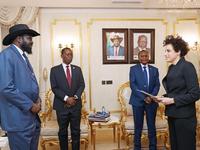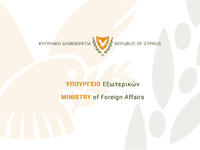Press Releases

31-08-2018 09:07
Statement by the Deputy Permanent Representative of Cyprus to the UN at the Security Council Open Debate on the Maintenance of International Peace and Security
The Republic of Cyprus was represented on Wednesday, 29th of August, 2018, by the Deputy Permanent Representative of Cyprus to the UN, Ms Polly Ioannou, at the Security Council Open Debate on the Maintenance of International Peace and Security: Mediation and Settlements of Disputes. Following is the full text of the intervention of Ms Ioannou:
“Thank you, Mr. President, and our thanks to the UK Presidency for organizing this debate. My delegation fully subscribes to the EU statement which has been delivered.
As a conflict state and a beneficiary of the long running good offices mission of the UN Secretary General in Cyprus, entrusted to him by this Council, Cyprus has insights and lessons learnt to share, even though the role of the UN in our conflict is limited to facilitating agreement by the parties.
Mediation is an important tool prescribed by the Charter for the peaceful settlement of disputes, provided it is used in line with the Charter and respecting the special role assigned by the latter to the Security Council.
Experience has shown that there is sometimes a disconnect between the Council and the mediator appointed as part of the UN’s effort to contribute to the peaceful settlement of a dispute. For such mediation to be effective, the Council must be able to assume responsibility for the work of the mediator. This would require the two to work in tandem.
Experience has also shown that we could benefit from more clarity as regards the framework of the UN’s engagement in mediation and the code of conduct of UN officials acting as mediators on behalf of the organization. We believe that a more consistent and rules-based approach is required and the Council could develop a manual to this end.
At the core of the UN’s involvement in mediation should be the inviolable rule of conducting the process on the basis of the organization’s values and principles, the UN Charter and international law. These norms and principles mean that the UN does not operate in a vacuum and that, while it should be impartial, it should not be neutral.
As a mediator, the UN must not be intrusive but should respect the boundaries of third-party facilitation and assist the parties as they themselves shape the resolution of their dispute. The parties should own both the dispute-resolution process and its outcome, as they are the ones who will have to live with the outcome and ensure its durability and successful implementation.
As experience has demonstrated that acrimony and blame games can arise as a result of mediation proposals that the parties are called upon to accept or reject, UN mediators must tread carefully, be cognizant of the complexities of a dispute, and know the realm of the feasible. This is why the importance of selecting a mediator on the basis of substantial criteria cannot be overstated.
Successful mediation necessitates deep knowledge of local circumstances, not only those pertaining to the root causes and the particulars of a conflict but the entire political, strategic, socio-economic, cultural, and historical context and circumstances underpinning a dispute and its resolution process.
When acting as a mediator, the UN is well-placed to provide examples of good practices in dispute resolution processes but should always keep in mind that what works in one context may not be transplanted in another, even if two situations present commonalities. Also, sharing good practices should not be a vehicle to maneuver the parties towards a specific direction or outcome.
The UN should be extra cautious with enhanced mediation methods like arbitration as a tool of political or non-judicial third-party intervention. Endorsement by the Council should be required in such cases, while the Council should bear in mind that even if there is consent of the parties, this consent can be coerced.
Elaborating parameters for UN mediation would enable the Council to make greater, yet prudent, use of mediation as a tool of exercising its overall responsibility to maintain international peace and security, in combination with other tools, under its direct supervision. The Council can also strive for subsidiarity when there is a well-placed regional or local actor close to a conflict who can ably contribute to its resolution. This could also be done before the Council is seized of the matter, in line with the spirit of Article 33 of the Charter. This can be done without prejudice to the role of the Council as the eminent organ responsible for peace and security and respecting established principles like the voluntary character of mediation and the consent of the parties.
Before closing, two equally critical points:
1. Peacekeeping is a crucial component of conflict resolution. Enabling environments in which to conduct peace processes depend on PKOs, and so does preventing escalation within a conflict, establishing channels with relevant actors on the ground, and developing an understanding of local circumstances.
2. The participation of women in conflict resolution is by now universally supported and indeed it can be a game-changer. For that to happen however, this participation needs to be meaningful, and the way for it to be meaningful is by achieving gender equality more broadly in a society and reflecting that in the participation of women across public life and in core political decision-making.
Thank you.”
Relevant Press Releases

15-04-2024 14:04
The Ambassador of Cyprus to South Sudan presented her credentials

14-04-2024 12:45
Statements by the President of the Republic


11-04-2024 19:20
Official visit of the Foreign Minister of Andorra to Cyprus


